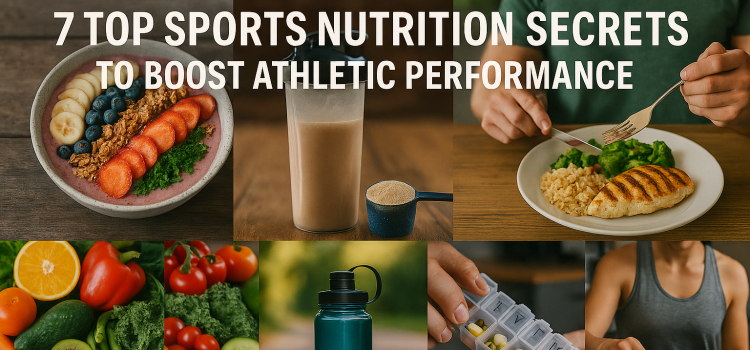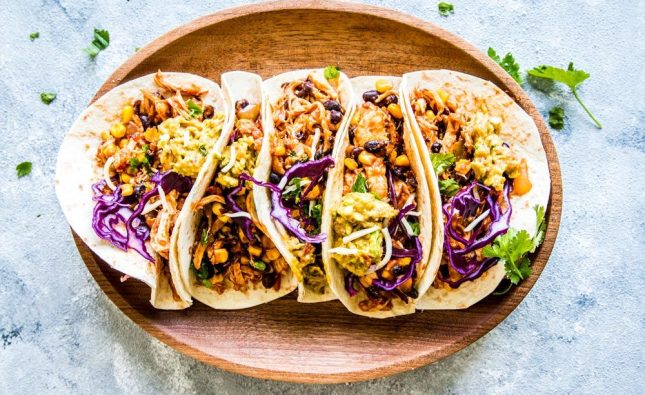
Introduction
Every athlete knows that training hard matters. Yet nutrition can be the game-changer. Discovering the right sports nutrition secrets can help you boost athletic performance and recover faster. Good fueling makes workouts more productive. Smart eating guards against injury. And proper hydration keeps muscles strong.
In this guide, we reveal seven key strategies to improve strength, speed, and endurance. We cover pre-workout nutrition, post-workout nutrition, hydration strategies, and more. You will learn how to balance carbs, proteins, and fats. You’ll see why nutrient timing can make or break your training session. We also explore which performance supplements truly work, and why overlooked micronutrients deserve attention.
Whether you are a weekend warrior or a pro, these sports nutrition tips will fit into any schedule. Read on to transform your diet and unlock peak performance.
What Is Pre-Workout Nutrition?
Pre-workout nutrition means the food and drink you consume before exercise. Its goal is to fuel muscles and brain for peak effort. A good pre-workout meal boosts energy without causing stomach upset.
Aim for a blend of carbohydrates and some protein 1–3 hours before you train. Carbs top up your muscle fuel, known as glycogen. Protein helps reduce next-day muscle soreness. Examples include a banana with peanut butter, yogurt with granola, or a small turkey sandwich.
Tip: Test timing in training, not on race day. Everyone digests at different rates. Adjust the mix and timing until you feel strong and comfortable.
By mastering pre-workout nutrition, you avoid mid-session energy crashes and improve overall performance.
Why Macronutrient Balance Matters
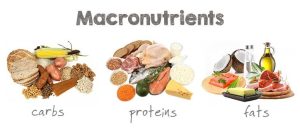
Balancing carbs, proteins, and fats—also called macronutrient balance—is key for athletes. Carbs provide quick fuel. Protein repairs and builds muscle. Fats support long-term energy and hormone health.
A typical athlete’s split might be 50–60% carbs, 20–25% protein, and 20–25% fats. Endurance athletes lean toward more carbs, while strength athletes boost protein. Include whole grains, lean meats, nuts, seeds, and healthy oils like olive or avocado.
Tip: Use the plate method—half your plate veggies, a quarter lean protein, and a quarter whole grains or starchy vegetables. Add a small drizzle of healthy fat.
Achieving the right macronutrient balance ensures you have steady energy, robust recovery, and lasting health.
How Nutrient Timing Boosts Gains

Nutrient timing refers to eating at optimal times around your workout. The most critical window is the 30–60 minutes after training, when your body is primed to absorb nutrients. Eating or drinking a mix of carbs and protein then speeds muscle recovery and glycogen refill.
For example, a shake with 20 grams of whey protein and 40 grams of carbs can jump-start recovery. If you train in the evening, have a balanced dinner within two hours. For morning workouts, a protein-packed smoothie soon after you finish keeps you strong.
Tip: Plan simple, portable snacks like Greek yogurt with honey or a rice cake topped with almond butter to hit the post-workout window.
Good nutrient timing turns hard work in the gym into real muscle and performance gains.
What Are Effective Hydration Strategies?

Hydration strategies go beyond “drink water.” Sweat rates differ per person. Losing even 2% of body weight in sweat can harm performance and focus. A simple way to track hydration is weighing before and after workouts. For every pound lost, drink about 16–20 ounces of water.
Before exercise, aim to drink 16–20 ounces two hours prior. During long sessions, sip 7–10 ounces every 10–20 minutes. For workouts over an hour, include an electrolyte drink with sodium and potassium to replace what you lose in sweat.
Tip: Monitor urine color—pale yellow signals good hydration. Darker shades mean you need more fluid.
Following these hydration strategies keeps you at your best and wards off cramps and fatigue.
What Is Post-Workout Recovery Nutrition?

After training, your body needs fuel to repair and grow. Recovery nutrition focuses on protein and carbs within two hours of exercise. Proteins rebuild muscle fibers. Carbs restore energy levels.
A balanced meal might include grilled chicken, sweet potatoes, and steamed broccoli. Or try a snack like a protein bar with fruit. Aim for 20–30 grams of protein and 40–60 grams of carbs in this window.
Also, include a small amount of healthy fat to help absorb fat-soluble vitamins. Avocado toast or a handful of nuts works well.
Tip: If you can’t eat a full meal, start with a drinkable option like a chocolate milk shake, then follow up with real food.
Solid post-workout nutrition means less muscle soreness and quicker bounce back.
Which Performance Supplements Really Work?
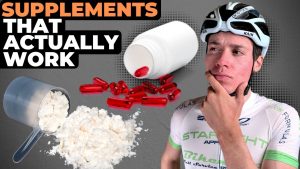
The supplement market is huge, but only a few are truly backed by research. Performance supplements that work include creatine, caffeine, beta-alanine, and branched-chain amino acids (BCAAs).
Creatine boosts strength and power in short bursts. A daily 5-gram dose is safe and effective. Caffeine, taken 30–60 minutes before exercise, improves focus and reduces perceived effort. Beta-alanine can delay fatigue in high-intensity efforts when taken regularly. BCAAs may help reduce muscle soreness, especially when your diet is low in protein.
Tip: Buy from reputable brands that third-party test for purity. Avoid proprietary blends that do not list ingredient amounts.
Using these performance supplements smartly can give you an edge in training and competition.
Why Micronutrients and Antioxidants Matter
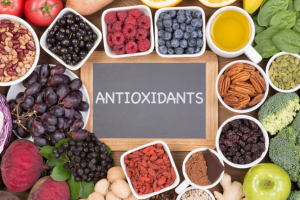
Vitamins and minerals—known as micronutrients—play vital roles in athletic health. Iron carries oxygen in your blood. Calcium and vitamin D support strong bones. B-vitamins help convert food into energy.
Athletes need more antioxidants like vitamin C, E, and selenium to fight exercise-induced oxidative stress. Berries, nuts, leafy greens, and citrus fruits supply these nutrients. A colorful diet, not just supplements, gives you the full spectrum of micronutrients your body needs.
Tip: Consider a daily multivitamin if your diet has gaps, but aim to get most nutrients from whole foods.
Emphasizing micronutrients and antioxidants supports metabolism, immunity, and long-term health.
Table: Sports Nutrition Secrets at a Glance
| Secret | Key Action | Benefit |
|---|---|---|
| Pre-Workout Nutrition | Eat carbs + protein 1–3 hours before | Improved energy, reduced fatigue |
| Macronutrient Balance | 50–60% carbs, 20–25% protein/fat | Steady energy, muscle repair |
| Nutrient Timing | Eat carbs+protein within 1 hour after | Faster recovery, more gains |
| Hydration Strategies | Drink before, during, after exercise | Prevents cramps, maintains focus |
| Post-Workout Recovery Nutrition | Protein+carbs meal within two hours | Less soreness, faster muscle repair |
| Performance Supplements | Use creatine, caffeine, beta-alanine | Enhanced strength, delayed fatigue |
| Micronutrients & Antioxidants | Colorful produce, lean protein, dairy | Improved immunity, bone & heart health |
Conclusion
Unlocking peak performance relies on more than hard work. These seven sports nutrition secrets—from pre-workout nutrition to micronutrients and antioxidants—give your body the fuel it needs. By mastering macronutrient balance, nutrient timing, and smart hydration strategies, you keep energy high and recovery quick. Using proven performance supplements and focusing on vital micronutrients fills the gaps in your diet. Start applying these evidence-based tips today, and watch how they boost athletic performance and support lasting wellness on your fitness journey.
Call-to-Action (CTA): Ready to elevate your game? Download our free sports nutrition meal plans and start fueling your success today!








